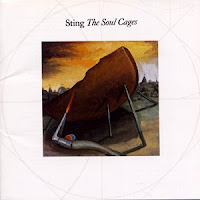“The Soul Cages,” a Sting album about boyhood grief, remains this strangely powerful if demanding narrative, one with textured song structures and densely emotional themes.
Its triumph comes right away, though, on the opener “Island of Souls” — a compellingly dark, perfectly conceived tale of a riveter’s son whose dream of the open sea only grows more intense when he becomes an orphan after a shipyard accident.
“Island of Souls,” like much of this album, takes on life and its aftermath with a depth of introspection that’s remarkable even today. Sting entered the studio in the wake of his dad’s death, and there is from the beginning a kind of helpless melancholy about “The Soul Cages,” something that likely accounts for its relative obscurity.
It doesn’t even look like an album by Sting. Clearly lost in the work, he commissioned a painting by the Scottish artist Steven Campbell for the front, making “The Soul Cages” his only studio album to date not to feature a cover photo of himself.
Similarly, the boy in these tunes, as with most children, is never in the forefront. Dad looms large, as the provider, the corrective measure, the friend lost to work and responsibility. His father, like the sea that beckons, is a roiling mystery, a source of comfort and conflict — and a kind of ultimately sad hagiography for what lies ahead in the boy’s own life, perhaps no where more than on “Island of Souls”:
He felt he’d been left on a desolate shore,
to a future he desperately wanted to flee.
What else was there for a shipbuilder’s son?
A new ship to be built, new work to be done
As his father’s effort on yet another towering project creates shadows over their town, the cyclic, never-done drudgery of this work begins to fully dawn on the boy. He wants to save his dad, wants to save their relationship. He returns again and again to the idea of taking the latest soon-to-be completed vessel out to sea, just the two of them, a dream that intensifies when his dad is mortally injured.
One day he dreamed of the ship in the world.
It would carry his father and he,
to a place they would never be found …
to a place far away from this town.
When Sting decries a life where “a working man works ’til the industry dies,” “Island of Souls” connects, too, as a cutting rumination on our ongoing economic uncertainty.
Sting, who grew up near the dying shipyards of Newcastle, England, is joined on the record by keyboardists Kenny Kirkland and David Sancious; guitarist Dominic Miller; drummer Manu Katche; and saxophonist Branford Marsalis, among others. Together, they offer a spacious minimalism, even as they improvise with structure — turning “Island of Souls” into an entertaining, protean exploration of musical styles that is not exactly pop, but also isn’t classical or jazz.
Confident and artistically challenging, there couldn’t be a more appropriate opener for “The Soul Cages” — to me, Sting’s first fully realized solo recording. This album became his most definitive step, to that point, away from the successes of seminal 1980s hitmakers The Police. That starts with this song.
“Island of Souls” transcends the specifics of Sting’s loss by tapping into the lasting desires that every child holds, and the fears that we carry on into adulthood: We’d like to have parents who consistently guide us through happy adventure, rather than the ones who come home tired and distracted after another day’s work. It’s not to be, of course. Not if the lights are going to stay on.
But we remember, forever, those fleeting moments when our parents’ eyes softened, when everything seemed possible on a Saturday afternoon. And we hope to do better by our own kids.
[amazon_enhanced asin=”B000W25C9K” price=”All” background_color=”FFFFFF” link_color=”000000″ text_color=”0000FF” /] [amazon_enhanced asin=”B000002G2R” price=”All” background_color=”FFFFFF” link_color=”000000″ text_color=”0000FF” /] [amazon_enhanced asin=”B00479WMQA” price=”All” background_color=”FFFFFF” link_color=”000000″ text_color=”0000FF” /] [amazon_enhanced asin=”B0047DVVVI” price=”All” background_color=”FFFFFF” link_color=”000000″ text_color=”0000FF” /] [amazon_enhanced asin=”B000W2162W” price=”All” background_color=”FFFFFF” link_color=”000000″ text_color=”0000FF” /]
- Nick DeRiso’s Best of 2015 (Rock + Pop): Death Cab for Cutie, Joe Jackson, Toto + Others - January 18, 2016
- Nick DeRiso’s Best of 2015 (Blues, Jazz + R&B): Boz Scaggs, Gavin Harrison, Alabama Shakes - January 10, 2016
- Nick DeRiso’s Best of 2015 (Reissues + Live): John Oates, Led Zeppelin, Yes, Faces + others - January 7, 2016





Still my favorite Sting solo album and this is probably my second favorite song on it, just a smidge behind “Wild, Wild Sea.”
How about a pop record with oboe? What an amazing, haunting song and album. Well done, Nick.